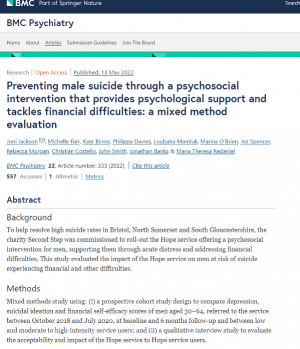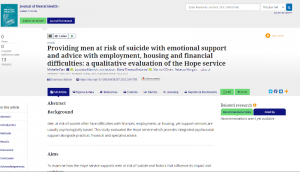“Hope saved my life”: How the Hope project helped men at risk of suicide
14 July 2022
A project to help men aged 30-64 who are at risk of suicide has saved lives and reduced depression and suicidal thoughts, a study by National Institute for Health and Care Research (NIHR) funded researchers at the University of Bristol has shown. Hope, run by mental health charity Second Step, aims to help men in mental health crisis because of debt, financial, employment or welfare difficulties.
Rates of death from suicide are higher in the Bristol, North Somerset and South Gloucestershire (BNSSG) area than other parts of England. The five year average suicide rate in men aged 35 to 64 is 25.9 per 100,000 in Bristol, compared to 19.7 per 100,000 across England.
ONS data shows that around three-quarters of all suicides are among men, with the highest rates occurring in middle age, so Hope is aimed at this group. It was piloted in 2016 and in 2018 it was rolled out across the BNSSG area.
Hope addresses the distress created by debt, financial, employment or welfare difficulties. It takes mental health and social circumstances into account and doesn’t just focus on one aspect of a man’s life.
Researchers from the NIHR Applied Research Collaboration West (NIHR ARC West) used questionnaires to compare how men felt before and after being in the Hope project for six months. The questionnaires focused on depression, suicidal thoughts and whether the men felt in control of their finances. They also interviewed the men using Hope and the staff delivering it.
The results, published in BMC Psychiatry and the Journal of Mental Health, demonstrate the profound effect that Hope had on the men who engaged with it.
Eighty men completed the questionnaire after six months, compared to 105 who completed the first questionnaire. There was around a 50 per cent reduction in both depression and suicidal thoughts after six months of being in the Hope project, compared to when the men first started with Hope. They felt 26 per cent more in control of their finances.
Researchers also interviewed 16 men to understand whether Hope was acceptable to them and the impact it had. The interviews showed how ‘Hope saved my life’ for several of the men. Most men described being able to move forward and tackle challenges with more confidence.
Interviews also demonstrated how Hope helped men deal with the multiple problems they faced:
“When I first met up with (Hope project worker) I was determined that life was at the end and I was fed-up and she turned it around. Like I couldn’t get a bank account and she got me a bank account… I blow everything up into a really big problem and she cut it down into digestible chunks… helped me through all of it. It’s been great.”
This Hope client was supported with their housing, welfare benefits and debt issues, alongside ongoing addiction and mental health problems.
Both men and staff said Hope created a space where men felt comfortable and were able to express themselves, free from the social norms and pressures associated with masculinity.
This research shows Hope offers practical and emotional support to men who have experienced suicidal feelings, redundancy, homelessness and poverty.
Hope occupies an important space between mental health and social care, cutting across the boundaries between psychiatric care and social advice agencies. The research demonstrates the value of providing an integrated service.
The findings are being submitted to the UK Government’s call for evidence to inform their mental health and wellbeing plan.
Joni Jackson, Research Associate at the University of Bristol and ARC West, said:
“Hope is clearly a lifeline for many of the men who participated in it. It’s shown real benefits for those men who engaged with it. Our study demonstrates how a more integrated approach can really help people at very difficult times in their lives.”
Aileen Edwards, Chief Executive of Second Step, said:
“It’s fantastic to lead an organisation that has delivered such an innovative and trailblazing suicide prevention project. Hope has saved hundreds of men’s lives in Bristol and beyond.
“This much-anticipated evaluation proves that our approach is the right one and ensures that our mix of emotional and practical support can be replicated across the country.”
Christian, a former Hope client who now works for Second Step as a Recovery Coach, said:
“It was only a few years ago now that I was convinced that there was no way back for me really. That’s how bad I felt. Hope let me see a way forward and that things could change and improve. I feel like a different person to how I was then. I am excited and positive looking to my future.”
Paper

Preventing male suicide through a psychosocial intervention that provides psychological support and tackles financial difficulties: a mixed method evaluation
Download the paperAdditional papers
